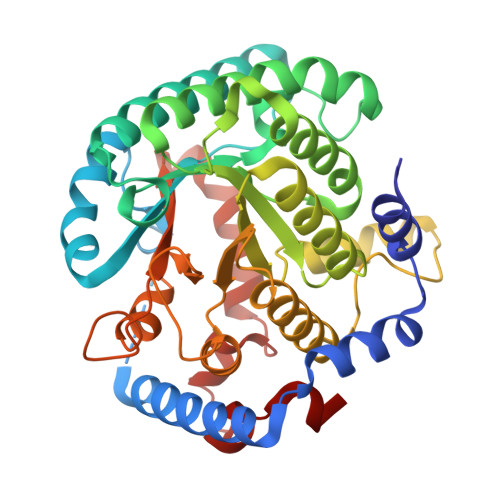Noncovalent Inhibition and Covalent Inactivation of Proline Dehydrogenase by Analogs of N -Propargylglycine.
Tanner, J.J., Ji, J., Bogner, A.N., Scott, G.K., Patel, S.M., Seravalli, J., Gates, K.S., Benz, C.C., Becker, D.F.(2024) Biochemistry 63: 2855-2867
- PubMed: 39437336
- DOI: https://doi.org/10.1021/acs.biochem.4c00429
- Primary Citation of Related Structures:
8UPZ, 8UQ0, 8UQ1, 9C8A, 9C8B, 9C8C - PubMed Abstract:
The flavoenzyme proline dehydrogenase (PRODH) catalyzes the first step of proline catabolism, the oxidation of l-proline to Δ 1 -pyrroline-5-carboxylate. The enzyme is a target for chemical probe discovery because of its role in the metabolism of certain cancer cells. N -propargylglycine is the first and best characterized mechanism-based covalent inactivator of PRODH. This compound consists of a recognition module (glycine) that directs the inactivator to the active site and an alkyne warhead that reacts with the FAD after oxidative activation, leading to covalent modification of the FAD N5 atom. Here we report structural and kinetic data on analogs of N -propargylglycine with the goals of understanding the initial docking step of the inactivation mechanism and to test the allyl group as a warhead. The crystal structures of PRODH complexed with unreactive analogs in which N is replaced by S show how the recognition module mimics the substrate proline by forming ion pairs with conserved arginine and lysine residues. Further, the C atom adjacent to the alkyne warhead is optimally positioned for hydride transfer to the FAD, providing the structural basis for the first bond-breaking step of the inactivation mechanism. The structures also suggest new strategies for designing improved N -propargylglycine analogs. N -allylglycine, which consists of a glycine recognition module and allyl warhead, is shown to be a covalent inactivator; however, it is less efficient than N -propargylglycine in both enzyme inactivation and cellular assays. Crystal structures of the N -allylglycine-inactivated enzyme are consistent with covalent modification of the N5 by propanal.
Organizational Affiliation:
Department of Biochemistry, University of Missouri, Columbia, Missouri 65211, United States.


















